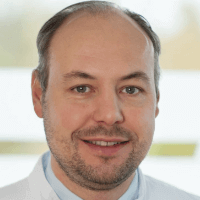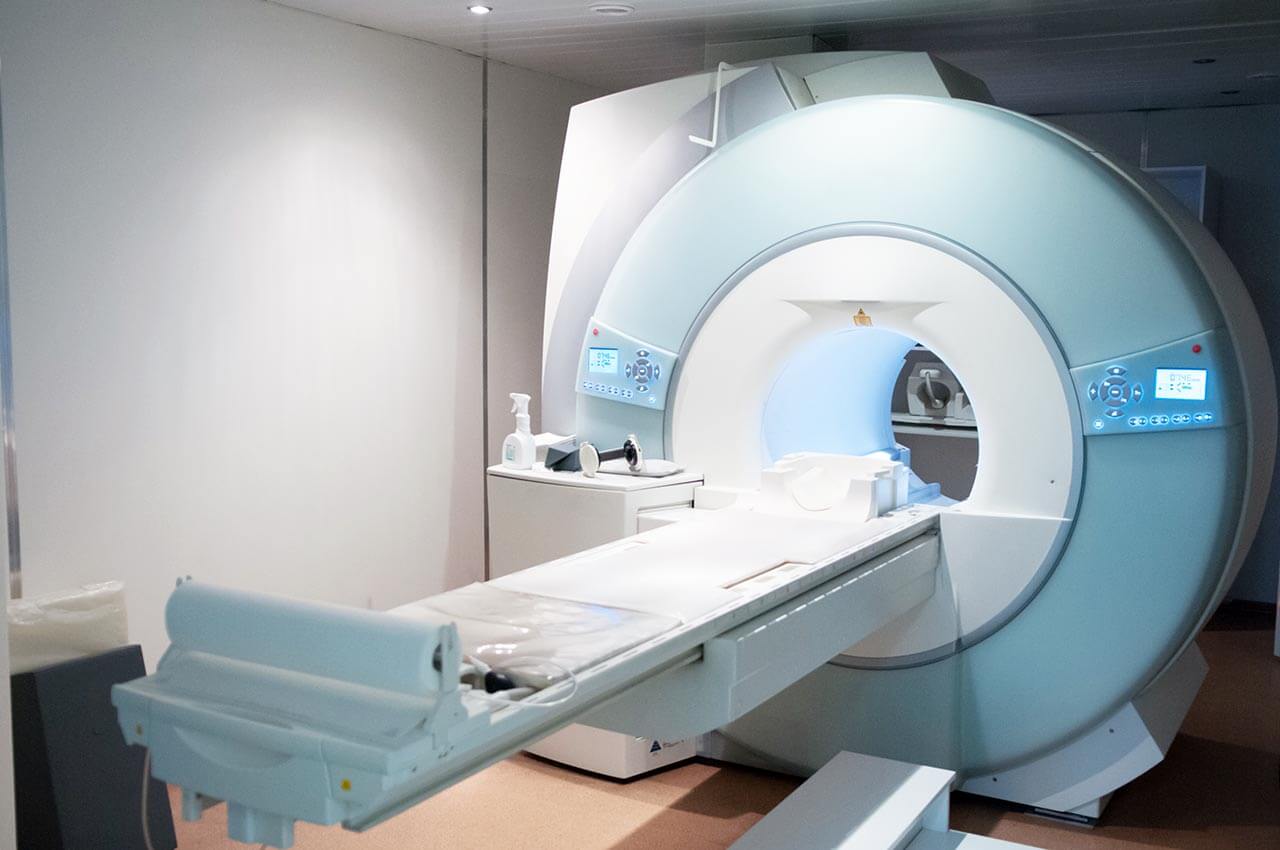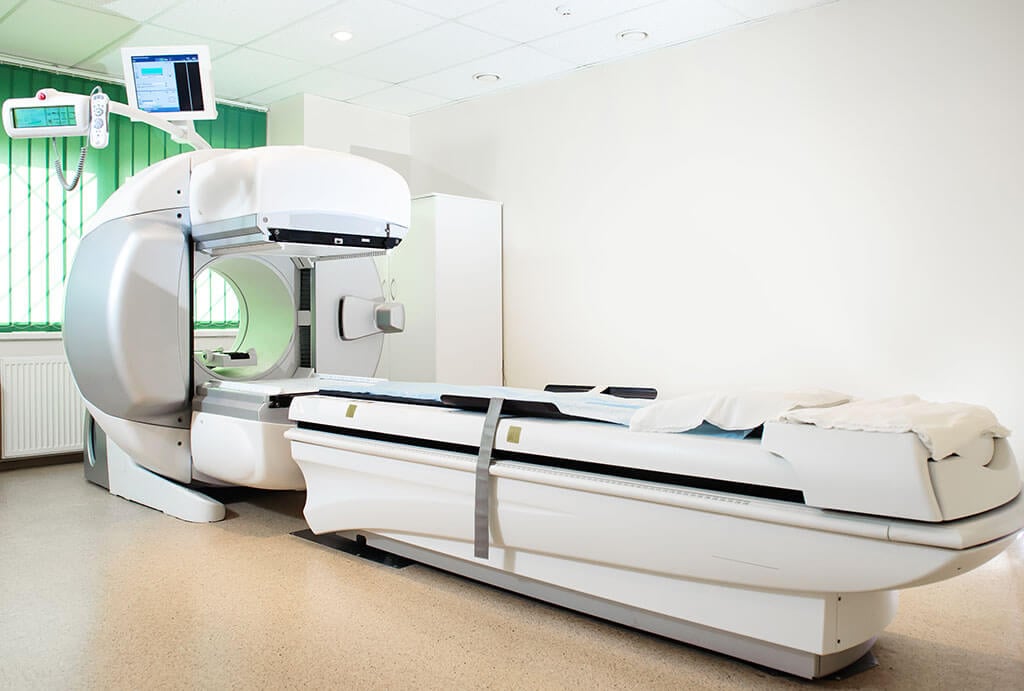
The program includes:
- Initial presentation in the clinic
- clinical history taking
- review of medical records
- physical examination
- laboratory tests:
- complete blood count
- inflammation indicators (CRP, ESR)
- abdominal ultrasound
- MRI of the abdominal cavity (on indication 1200 €)
- nursing services
- consultation of related specialists
- consultation of the chief physician and all leading experts
- development of dividual treatment plan
- written statement
Required documents
- Medical records
- Abdominal ultrasound (if available)
- MRI/CT scan of the abdomen and pelvis (if available)
Service
You may also book:
 BookingHealth Price from:
BookingHealth Price from:
About the department
The Department of Colorectal Surgery at the DKD HELIOS Clinic Wiesbaden specializes in all modern surgical interventions for the treatment of rectal, anal and colon diseases. The medical facility began its work in 1972, and therefore it has rich traditions and colossal experience, which allows finding optimal solutions even in the most difficult clinical situations. The area of competence of the department's doctors includes the treatment of hemorrhoids, anal fistulas, fissures and abscesses, fecal incontinence, chronic constipation, chronic inflammatory bowel diseases (Crohn's disease and ulcerative colitis) and many other pathologies. The department's specialists prefer sparing minimally invasive surgery. In addition, the department successfully performs laser surgical interventions and the innovative STARR procedure – stapled transanal rectal resection. The optimal type of surgical intervention is selected for each patient individually, after a thorough diagnostic examination and assessment of the effectiveness and risks of all therapeutic methods. Minor surgical interventions can be performed outpatiently, which eliminates the need for a hospital stay. After the operation, the patient receives quality care and undergoes follow-up examinations to assess the treatment outcomes. The department is headed by Prof. Dr. med. Nils Habbe.
The successful treatment of any disease is possible only with the comprehensive examination and an accurate diagnosis. Therefore, the department is equipped with state-of-the-art diagnostic equipment. The diagnostic rooms of the department serve for the diagnostic tests to assess the functions of the rectum and colon, identify the causes of fecal incontinence and impaired bowel emptying, detect benign and malignant colon tumors. The specialists also perform preventive colonoscopy to check for chronic inflammatory bowel disease (Crohn's disease and ulcerative colitis).
After studying diagnostic results, doctors start planning treatment. At the initial stages of proctological diseases, the department's specialists often achieve good results using conservative methods (drug therapy), but usually patients seek medical help only at the advanced stages of proctological disease, when the only effective treatment is surgery. Due to the constant updating of surgical equipment in the operating rooms and advanced training of doctors, the department can offer the very latest surgical techniques. For many years, the department's surgeons have successfully performed minimally invasive surgery, which allows minimizing trauma to healthy tissues during the treatment and facilitates postoperative recovery. In addition, such operations are associated with a low risk of complications and mild pain in the postoperative period.
The department performs transanal endoscopic microsurgery to remove rectal polyps and small tumors. When treating rectal diseases, doctors often use laser technologies. Such therapeutic procedures are highly safe for the patient, while their effectiveness is in no way inferior to classical surgery. It is worth noting that the department's surgeons offer the innovative STARR surgical technique for the treatment of rectal emptying disorders associated with rectocele. The doctors use a surgical approach through the anus. The prolapsed section of the rectal wall is resected using a special stapler. The device provides instant tissue removal and connection of the incision edges with small titanium staples. The patients usually tolerate this surgery well, without severe pain. Typically, the hospitalization period after theSTARR surgery does not exceed 2-3 days.
The department's range of medical services includes:
- Diagnostics
- Comprehensive proctological examination with functional diagnostics
- Special set of diagnostic examinations to identify the causes of fecal incontinence
- Functional diagnostics of the colon
- Diagnostics of benign and malignant colon tumors
- Colonoscopy, including polyp removal
- Treatment
- Pelvic floor surgery for rectal prolapse, fecal incontinence
- Rectal resection with sphincter preservation (including transanal access) for rectal prolapse
- Transanal endoscopic microsurgery and classical surgery for rectal polyp removal
- Organ-preserving surgery for chronic inflammatory bowel disease (ulcerative colitis and Crohn's disease)
- Surgery for the formation of an intestinal stoma and its closure
- Transanal rectal surgery using the STARR (stapled transanal rectal resection) technique
- Gentle minimally invasive surgery
- Laser surgery (NdYag laser)
- Rectal sphincter reconstruction or replacement
- Sacral nerve stimulation for neurogenic defecation disorders
- Surgery for anal fistula removal followed by plastic repair
- Stapled hemorrhoidopexy (Longo procedure)
- Bipolar hemorrhoids coagulation with the LigaSure device
- Laparoscopic minimally invasive catheter placement for peritoneal dialysis (continuous ambulatory peritoneal dialysis)
- Biofeedback for anal sphincter weakness
- Rubber band ligation for hemorrhoids (on an outpatient basis)
- Other diagnostic and therapeutic options
Curriculum vitae
Prof. Dr. med. Nils Habbe is the Head of the Department of Colorectal Surgery at the DKD HELIOS Clinic Wiesbaden. Of particular clinical interest to the specialist is both conservative and surgical treatment of rectal and anal diseases, including hemorrhoids, anal fissures, anal abscesses and fistulas. Dr. Habbe has extensive experience in the field of pelvic floor surgery and laparoscopic surgery. One of the key focuses of his work is the surgical treatment of Crohn's disease and ulcerative colitis.
Prior to becoming Chief Physician in the Department of Colorectal Surgery at the DKD HELIOS Clinic Wiesbaden, the specialist was a Senior Physician in the Department of Abdominal Surgery at the University Hospital Frankfurt. Prof. Nils Habbe received his medical education at the Philipps University of Marburg. The doctor underwent his professional postgraduate training in the Department of Abdominal, Thoracic and Vascular Surgery at the University Hospital Marburg. His doctoral dissertation in medicine was followed by an internship at the Johns Hopkins School of Medicine in Baltimore. On January 24, 2018, Dr. Habbe received the title of Extraordinary Professor at the Johann Wolfgang Goethe University of Frankfurt, where he teaches coloproctology to this day.
Prof. Nils Habbe received the Theodor Billroth Prize and the Travel Award from the American Pancreatic Association for his outstanding clinical work. The doctor is a member of the German Society of Surgery, the German Society of General and Abdominal Surgery and the German Society of Coloproctology.
Photo of the doctor: (c) DKD Helios Klinik Wiesbaden
About hospital
The DKD HELIOS Clinic Wiesbaden has long made a name for itself in the international medical arena by introducing an optimal model of medical care, combining the use of the most advanced medical technologies, the experience of highly qualified doctors and impeccable quality of patient care. The medical facility first opened its doors to patients in 1970. The world famous Mayo Clinic Rochester in America served as a model for the design of the medical complex. Since the foundation of the clinic, the main direction of its activities has been comprehensive diagnostics of complex diseases integrated into an interdisciplinary treatment concept. Today, an integral part of clinical practice is also preventive diagnostics aimed at the early detection of pathological changes in the human body. In recent years, the clinic has been actively developing the direction of surgery, in which it has significantly succeeded. The clinic enjoys a reputation as one of the best medical facilities in Europe in the field of endocrine and colorectal surgery, as well as in hernia repair surgery.
The clinic has 24 specialized departments. Each of them offers a team of experienced doctors, whose main value is the patient's health. The work of all doctors of the medical facility is based on a single credo – "Treat not a disease, but a patient". According to this belief, the course of treatment should be as individual as possible, taking into account the patient's physical characteristics, lifestyle, diet, emotional state, etc.
The clinic's bed capacity consists of 138 inpatient beds and 60 beds in a day hospital. Many diagnostic and therapeutic procedures are performed on an outpatient basis. The diagnostic and treatment rooms, like the operating rooms of the clinic, are equipped with state-of-the-art technology to ensure the observance of strict hygiene and safety standards. The advanced medical equipment allows detecting the slightest changes in the functioning of organs and their structure with impeccable accuracy, thanks to which doctors can diagnose complex pathologies at the very early stages. This greatly increases the chances of a successful cure.
The location of the clinic in Wiesbaden, known as one of the oldest thermal spas in Europe, is another pleasant advantage for the patients. Arriving at the clinic for a preventive diagnostic examination, one can improve his health in the healing thermal springs, as well as enjoy the sightseeing of historical monuments. The medical center is located in the immediate vicinity of the English style Spa Park founded in the distant 1852, so in the free time from medical procedures one can take a pleasant walk in the beautiful park.
Photo: (с) depositphotos
Accommodation in hospital
Patients rooms
The patients of the DKD HELIOS Clinic Wiesbaden live in comfortable single and double rooms. Each patient room has an ensuite bathroom with shower and toilet. The standard patient room furnishings include an automatically adjustable bed, a bedside table, a table and chairs, a TV and a telephone.
The clinic also offers enhanced comfort rooms with spacious bathrooms, which additionally include a large mirror, hairdryer, changeable towels and toiletries. These patient rooms also have a safe for storing valuables, a free minibar with soft drinks, a flat-screen TV with satellite channels and free Wi-Fi.
Meals and Menus
The patients of the clinic are offered tasty and balanced three meals a day: breakfast, lunch and dinner. If for some reason you do not eat all the foods, you will be offered an individual menu. Please inform the medical staff about your dietary preferences prior to treatment.
The clinic also has a cozy cafe where one can taste delicious snacks, salads, main courses and desserts. One can also enjoy aromatic coffee, delicious tea and soft drinks in the cafe.
Further details
Standard rooms include:
Religion
The religious services are available upon request.
Accompanying person
During the inpatient program, the accompanying person can live with the patient in a patient room or a hotel of his choice. Our managers will help you choose the most suitable option.
Hotel
During the outpatient program, the patient can stay at the hotel of his choice. Our managers will help you choose the most suitable option.





